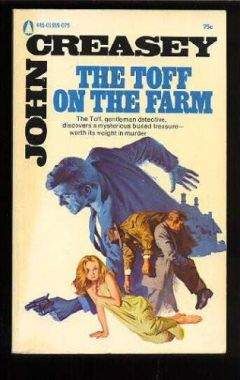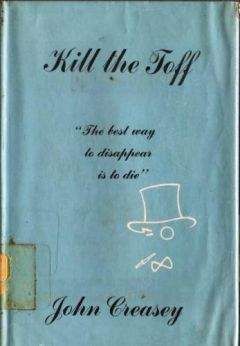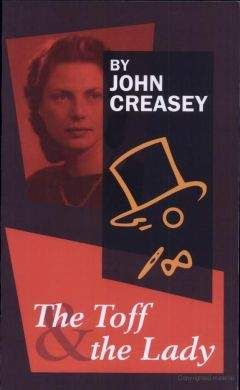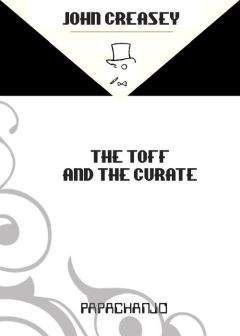John Creasey - The Toff and The Sleepy Cowboy
Height : 6’ 7”
Hair : Fair
Eyes : Pale brown
Distinguishing marks on face: None
Rollison put the card aside as Percy replaced the receiver.
“Me first?” he asked, and went on when Rollison nodded: “His wife answered. She says he’s in work, what she calls a very important part but they must not say what it is. When I said I might find him work for at least a month she said this present part would go on for a long time. Sound like your man?”
“It could well be,” Rollison said. “Percy, you’ve been invaluable. But then, you always are.” He sipped the brandy and they chattered for five minutes before Rollison stood up briskly and said: “I ought to be on the way.”
“Don’t wait so long before you come again,” Percy urged.
He was at his desk near the window when Rollison walked past, hand raised. A breeze set the leaves of the trees rustling, and would give Percy Bingham much pleasure; he had moved to this particular spot only when he had learned that he would never walk again.
Rollison reached his car.
Not long ago, not far from here, someone who had wanted him dead had put high-explosive under the bonnet, set to go off at a touch of the self-starter. It was absurd to think there was a booby trap under the bonnet here, but — well, he would look.
There, fastened to the self-starter, was a small plastic phial.
There, in fact, was a bomb.
He stood staring down, a shiver running up and down his spine. People passed, glancing at him. He looked along the street, then down to the canal and the path alongside it. The boys were still tossing stones but the ducks had gone. A car passed, slowly, and he looked up.
A man sitting next to the driver of the car, a Rover, was staring at him. He had a chubby face, a beautiful olive-skin, and fine brown eyes; Rollison had last seen him in Gresham Terrace.
The car gathered speed and went on, and before Rollison could move, other cars were in the roadway. Farther along, he saw a policeman’s helmet. He bent closer to see how the plastic container was fastened to the metal, and could see no way.
Suddenly, he realised that it was stuck on; and with a quick-setting glue, that probably meant it was very tight indeed. He straightened up, to find the policeman very close by, a pale-faced weakling of a man to look at.
“Good afternoon, sir.”
“Good afternoon,” returned Rollison, and forced a smile: “Do you recognise me by any chance?”
“No, sir, I —” the man began, and then his eyes lit up and he exclaimed. “You’re the Toff, sir! Mr. Rollison!”
“That’s right on the nose,” Rollison said. “You know that I’m not half-witted and mean what I say, don’t you?”
The man looked puzzled, but was game.
“Yes, sir.”
“Well, someone has glued what looks like a bomb on that part of the self-starter, under the bonnet,” Rollison said, pointing as he went on: “I have an urgent appointment, and can’t handle this job myself. Will you ask your division for help — don’t touch it yourself, it’s glued on.”
“I won’t touch it!” The policeman straightened up, gulping. “Then — then all of those stories they tell about you are true.”
“Oh, just one here and there,” Rollison said. “I must run.”
He did run, literally, to the end of the street known as South Canal, and saw three empty taxis pass just before he was near enough to hail, then had to wait several minutes for one, as only buses and private cars passed. His chief purpose in running was to make sure he was not held up by a lot of questions, which would be inevitable if divisional detective officers arrived.
A car slid to a standstill in front of him.
The man with the olive-coloured skin was at the open window, next to the driver, and he said :
“Are you Mr. Rollison?” He pronounced the name Rawlson.
“Yes, but —”
“Can I give you a lift?”
“No,” Rollison said, backing away as he went on solemnly : “My mother always told me never to go in cars with strangers.” He smiled fleetingly, then espied a taxi with its sign lighted, and he hurried towards it, one hand outstretched.
The man with the American voice might shoot him.
But nothing happened, and twenty-five minutes later Rollison got out of the taxi at the corner of Fell Street and, it proved, Rubicon Road. He paid the driver off, then stood at the corner, looking at a house which stood on its own, not really large but certainly not small. On a wooden door were the words : RUBICON HOUSE. No one was in sight when the taxi turned the corner, and Rollison walked slowly and thoughtfully towards the front door.
As he did so, he put one of the blow-pipe cigarettes to his lips.
This street door was unlocked and he went into a square hall, which had a few pieces of heavy furniture and two bamboo chairs, to see a staircase with an arrow on the wall, pointing upwards to Flats 3 and 4. He went up the wide carpeted staircase. As he reached the landing a small, young woman obviously far gone in pregnancy opened the door marked 3, came out and closed the door firmly. He turned towards the other flat across the landing, just saying:
“Good afternoon.”
“Good afternoon,” the woman returned, and went downstairs with unexpected vigour.
10
Wild, Wild West
ROLLISON STOOD AT THE DOOR of the fourth apartment until he had heard the woman’s footsteps clatter down the stairs, patter across the hall, and be cut off by the closing of the street door. Then he turned to the other door and tapped; there was no answer. He banged with the side of his clenched fist but there was still no answer.
He went down on one knee and examined the lock.
It was one of the old fashioned mortice type, difficult to open unless one had the know-how. He had. He took a knife from a special pocket in his trouser waist-band, one with a surprising number of blades — a souvenir of Poland, where knives were knives. This had a pick-lock blade. He used it quickly, not worrying too much about noise as the flat seemed to be empty. The barrel resisted for a long time but at last shot back with a snap of sound greater than he liked.
He paused, but no other sound came.
He pushed the door open cautiously, seeing more and more of the room beyond. Someone might be there, lying doggo: Alec George King, for instance. Certainly no one was in this room, which was pleasantly furnished but in no way remarkable.
Two doors led off on one side; one, off the other. He checked the one first; it was a bathroom. He checked one of the others to find a small kitchen. So the third door would lead to a bedroom. He pushed it open cautiously, and saw a huge, king size bed, the kind of bed a really tall man could stretch on.
On the bed was a stetson hat, of pale brown leather; and laid out was a suit which, even at first glance, was not a conventional cut. He went farther in, and at the side of the bed saw a pair of western riding boots, not unlike Tommy Loman’s. He felt quite certain that the guess that Tommy was to be impersonated was justified. Now, he needed to find out all he could about the plot.
There was a small dressing-table and a chest of drawers; he went through every drawer but found only clothes. A hanging cupboard was filled, half with a man’s apparel, half with a woman’s; there were no papers. He moved back to the living room and saw a small writing desk, much higher than most; obviously this was to allow Alec George King to get his knees under. The long middle drawer was unlocked and inside were oddments, cheque books, cheque stubs and letters. Rollison scanned the letters which were all demands for payment of overdue bills.
Folded in a bank statement was an even sharper demand for the clearance of an overdraft.
Rollison went through the other papers with extreme care, and found one thing he was looking for in the paying in book. A week ago, King had paid five hundred pounds into his bank account, putting this into credit by over three hundred pounds.
There was nothing to indicate where the money had come from.
Rollison tried two smaller drawers in the bureau; one was unlocked, and contained postage stamps, pins, clips and other trifles. The other was locked. He used the pick-lock blade of his knife again, and in a few moments the lock turned and he pulled the drawer open gently.
Inside, were pencilled notes kept in diary form. Obviously the early notes had been jotted down from memory, for they ran:
Sept. 15/16 — A.W. called.
Sept. 17— Saw A.W. who outlined the general idea.
Sept. 17/18 — Talked it over with Effie, who didn’t like it much.
Sept. 19 — Asked A.W. how much it would be worth — he said £5,000 minimum, £500 at once — cash.
Sept. 20 — Talked it over with Effie again and she agreed to go ahead if I would salt the first £500 away.
There followed some notes about a meeting with the mysterious A.W., his promise to pay a further £500 once King had started ‘the job’. There was a cryptic note: “I was always good in a Yankee part!” If that meant what it seemed to, King did not know the difference between a Yankee and a man from the south west, but that was a passing thought. How had King started to earn that second five hundred pounds? There was another note:
Oct. 3rd — Effie says she can’t tell the difference.
Oct. 4th — I did the tape and posted it to A.W.
Oct. 6th — A.W. delighted — he coughed up the second £500.
Rollison put this aside and looked about the room, saw a portable record player in one corner and a small tape recorder with several tapes kept in place with rubber bands, on a nearby stool. One tape was on the recorder, ready to play. Rollison studied the instrument and then switched it on. There were some squeaks and scratches, before a man’s voice sounded.
“Sure — that’s my name . . . I come from Tucson, Arizona . . . I work at the Lazy K ranch between Tucson and Nogales . . . Well, why not . . . Thomas G. Loman . . . I am twenty-eight years old . . . I was born in Truth and Consequences, New Mexico . . . My grandfather was English. He. . .”
Rollison heard the tape right through. There was a great deal of repetition, obviously King had been learning all he said by heart, so as to stand in another man’s place. Here in the heart of London an Englishman had been learning to take on the identity of Thomas G. Loman! He switched off, thinking that if he took the tape it would warn King that he had been traced; for the time being it would be better to leave it.
Rollison had been here for about half an hour.
The woman whom he assumed to be the Effie of the notes might be back at any moment. There wasn’t time to listen to any more tapes. He sat at the desk and scribbled out a copy of the notes and the dates, added the name and address of King’s bank manager, and went to the door leading to the landing.
He heard no sound.
He opened the door and stepped on to the landing, turned and bent down to lock the door, always more difficult, with a pick-lock, than opening it. He worried even less about noise, breathed with satisfaction as the lock clicked, straightened up, and turned round.
Framed in the open doorway of Flat 4 was a man who had a stocking drawn over his face, as a mask.
He covered Rollison with an automatic.
* * *
Rollison stood utterly still.
So, for a few moments, did the man with the gun. There were noises from the street; cars, whistling, voices. There was music from the flats below, but up here there was just the stillness and the silence. It seemed a long time before the man in the doorway said: “So you made it.”
“Sooner or later,” Rollison replied, “I always do.”
“You won’t after this,” the other said, softly. “Who knows?” Rollison shrugged.
“I know. You won’t live to.”
Rollison did not speak, but simply raised his eyebrows. The man in the doorway moved to one side, and said: “Come in.”
“I would rather stay here,” replied Rollison.
“So I’ll have to shoot you there,” the masked man retorted.
“I would rather you didn’t,” said Rollison, and began to walk towards the other.
The man could be the one who had hurled the hand grenade: there was no way of telling. His hand was steady and his voice cold and calculating; there was no way of being sure whether he would shoot. If he, Rollison, allowed himself to go into the other flat, he would be trapped; here, with the stairs and the hallway below, he had some freedom of movement.
He must take a chance and leap for the stairs.
It had to be the right moment — the exact moment.
He was within a yard of the man who could shoot him at point blank range, so it was literally now or never. He actually flexed his muscles to duck and spring towards the stairs when a door opened somewhere below, with a squeak, and footsteps sounded in the hall. The eyes behind the mask swivelled to one side and on that instant Rollison kicked the man on the shin. Gasp of pain and the swivelling of the gun came simultaneously but Rollison had time to chop with the side of his hand on the gun-wrist.
The gun fell.
“Stay down there!” Rollison roared. “Stay there!”
“Effie!” the man cried from behind the mask. “Effie!”
Rollison heard a cry from below, and turned his head to look towards the stairs. It was his first mistake, for the masked man, still gasping, backed into the room and disappeared. The door slammed. Rollison snatched at the handle, but the girl below began to cry out:
“Help, help! I’m being robbed.”
Rollison stood absolutely still, to try to collect himself.
The man would get away through the window and there was little chance of catching him; if he, Rollison, forced this door and went in he would be breaking and entering, very much on the wrong side of the law.
A man spoke downstairs and the woman whom the masked man had thought was Effie was screaming: he could just distinguish the words :
“Up there, up there!”
Rollison could run down the stairs and out of the house, or more wisely, go down and reason. He had what he wanted. The girl was now alarmed, and the wise thing was to have the police here as soon as possible. He could take them to King’s room, and the evidence of the plot to impersonate Tommy Loman would be indisputable.
So he called: “No one’s robbing anybody,” and he went to the head of the stairs.
The pregnant young woman was standing in the hall, a middle-aged man stood with his arm round her, a scared-looking woman was in the doorway of one of the flats. Effie was sobbing and screaming in a magnificent show of pretended hysterics, and of course she was trad-ing on her condition. She caught sight of him and pointed, screaming even more loudly :
“There he is, there he is!”
Rollison began to walk down the stairs. It was useless attempting to stop the girl, who was undoubtedly trying desperately to give the masked man time to get away. The middle-aged man looked as scared as the woman in the doorway.
“Now, don’t upset yourself, my dear, don’t upset yourself.”




